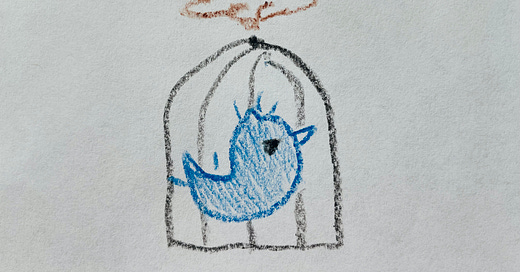The Business Model Makes (or Breaks) the Business
How Twitter Ended Up in a Cage of Its Own Making
It’s interesting how the choice of business model, or even the mindset around what type of business you are, ends up becoming a self-fulfilling prophecy.
I wonder if there has ever been a more dramatic example than Twitter of this dissonance where the choice of business / model leads to a drastically different outcome than what was otherwise possible.
There’s been lots of chatter recently about Twitter adding a paid subscription, and a lot of the negative reactions make sense from a consumer perspective - consumers who view Twitter as a media company don’t like the idea of switching from an ads based model to a subscription model. It’s like if your local newspaper suddenly said they were going to gate premium content ala the NY Times - what a bait and switch?!?
A subscription service is not the issue; it’s who the subscriber base is. Twitter (or it’s new overlords) want consumers to pay. When I first heard the news, I hoped it was meant for creators.
The entire issue here is that Twitter set itself up as a media business, and now we’re debating what monetization method is better for a media business. By the way, what kind of media business doesn’t create its own content or own the rights to the content produced on its platform?
“When you publish your thoughts on Twitter, you are doing labor for that company. Yes, you get followers, but you can’t take them with you. They can’t pay to support you, either. You’re the product, not the customer. Twitter needs your mind so it can satisfy its real customers: advertisers.”
What if Twitter had set itself up as as creator business and made the consumer user base secondary? What if the real users were the 1% creators (journalists, entertainers, thinkers, writers)? We would then be talking about a completely different business / model. The idea of a subscription service wouldn’t get a reaction like “is $8 reasonable for your daily newspaper?” - it would be “what is a reasonable monthly rate for a 1% creator who can monetize the hell out of their audience?” And make no mistake, Twitter is still the best platform to build and activate your audience for a variety of creators, but it’s losing ground fast.
The list of things that Twitter could have built and stitched admin / payment tools around is very long. Think of Substack as 1 sliver of Twitter’s potential. It really makes you think how 1 simple / early choice (“we’re a media company and we’re making money off ads”) changed the entire trajectory of what Twitter could have been…
I know what I’m describing is some sort of mytical “creator marketplace”. Except it’s not. Google it. Every other social media platform has a “creator marketplace”. It’s a huge missed opportunity for Twitter that all these new formats emerged while it debated 140 characters and an edit button ad nauseum.
I would love to hear other examples of these types of choices - if there was a compilation of these case studies I would buy that book in an instant!
As always, I’d also love to hear from readers on their struggles with business model mismatches - please chime in via comments👇. And if you enjoyed this post, please consider subscribing.
update:
After I wrote this, Jack published a proposal (linked below) that echos similar sentiments
The biggest mistake I made was continuing to invest in building tools for us to manage the public conversation, versus building tools for the people using Twitter to easily manage it for themselves. This burdened the company with too much power, and opened us to significant outside pressure (such as advertising budgets).
further reading / references
this post from the Chief Writing Officer (love that title) of Substack highlights what Twitter might have been if they had focused on creators vs consumers
my recent product paths post includes some ideas on how to deal with the missed pivots of the past while still capitalizing on the options that remain
By the way, for anyone who thinks this is hand-wavy 10K foot strategy, check out a much more detailed analysis on why Twitter should and still can make this pivot
Jack’s proposal for a native internet protocol for social media
childish drawing / interpretation





